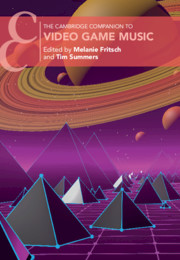Book contents
- The Cambridge Companion to Video Game Music
- Cambridge Companions to Music
- The Cambridge Companion to Video Game Music
- Copyright page
- Contents
- Figures
- Tables
- Musical Examples
- Contributors
- Preface
- A Landmark Timeline of Video Game Music
- Foreword: The Collaborative Art of Game Music
- Introduction
- Part I Chiptunes
- Part II Creating and Programming Game Music
- Part III Analytical Approaches to Video Game Music
- 9 Music Games
- 10 Autoethnography, Phenomenology and Hermeneutics
- 11 Interacting with Soundscapes: Music, Sound Effects and Dialogue in Video Games
- 12 Analytical Traditions and Game Music: Super Mario Galaxy as a Case Study
- 13 Semiotics in Game Music
- 14 Game – Music – Performance: Introducing a Ludomusicological Theory and Framework
- Part IV Realities, Perception and Psychology
- Part V Game Music, Contexts and Identities
- Part VI Beyond the Game
- 24 Producing Game Music Concerts
- Select Bibliography
- Index
9 - Music Games
from Part III - Analytical Approaches to Video Game Music
Published online by Cambridge University Press: 15 April 2021
- The Cambridge Companion to Video Game Music
- Cambridge Companions to Music
- The Cambridge Companion to Video Game Music
- Copyright page
- Contents
- Figures
- Tables
- Musical Examples
- Contributors
- Preface
- A Landmark Timeline of Video Game Music
- Foreword: The Collaborative Art of Game Music
- Introduction
- Part I Chiptunes
- Part II Creating and Programming Game Music
- Part III Analytical Approaches to Video Game Music
- 9 Music Games
- 10 Autoethnography, Phenomenology and Hermeneutics
- 11 Interacting with Soundscapes: Music, Sound Effects and Dialogue in Video Games
- 12 Analytical Traditions and Game Music: Super Mario Galaxy as a Case Study
- 13 Semiotics in Game Music
- 14 Game – Music – Performance: Introducing a Ludomusicological Theory and Framework
- Part IV Realities, Perception and Psychology
- Part V Game Music, Contexts and Identities
- Part VI Beyond the Game
- 24 Producing Game Music Concerts
- Select Bibliography
- Index
Summary
Within the field of game studies, much ink has been spilt in the quest to define and classify games based on their genre, that is, to determine in which category they belong based on the type of interaction each game affords. Some games lie clearly within an established genre; for example, it is rather difficult to mistake a racing game for a first-person shooter. Other games, however, can fall outside the boundaries of any particular genre, or lie within the perimeters of several genres at once. Such is the case with music games. While some may argue that a game can be considered to be a music game only if its formal elements, such as theme, mechanics or objectives, centre on music, musicians, music making or another music-related activity, in practice the defining characteristics of a music game are much less clear – or rather, are much broader – than with other genres. Many game publishers, players, scholars and critics classify a game as musical simply because it features a particular genre of music in its soundtrack or musicians make appearances as playable characters, despite the fact that little-to-no musical activity is taking place within the game.
- Type
- Chapter
- Information
- The Cambridge Companion to Video Game Music , pp. 140 - 158Publisher: Cambridge University PressPrint publication year: 2021
- 2
- Cited by

